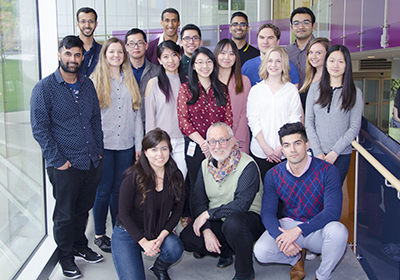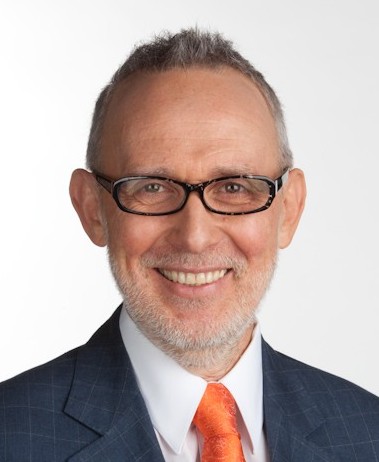
Principal Investigator
M.D. (Volgograd State Medical School), Ph.D. (Ivan Pavlov Institute of Physiology), FRCPC (University of British Columbia)
Professor, Division of Physical Medicine and Rehabilitation, Department of Medicine, University of British Columbia
Chair in Rehabilitation Research, ICORD
Associate Director, Rehabilitation Research, ICORD
Director, ICORD Autonomic Research Unit
Staff physician, Spinal Cord Program, GF Strong Rehabilitation Centre
Adjunct Professor, Departments of Physical Medicine and Rehabilitation, University of Western Ontario
Chair of International Autonomic Standards Committee, ASIA/ISCOS
Research Interests
Autonomic dysfunctions; Autonomic Dysreflexia; Blood Pressure Control; Bowel Dysfunctions; Epidural stimulation; Motherhood after SCI; Pain; spinal cord injury; Transcutaneous stimulation; Vascular dysfunctionsClick here for information on the Paralympic Research Project
Click here to visit the CHOICES Project website
Click here to visit the ABC of Autonomic Dysreflexia website
Click here for information about the 5th International Autonomic Symposium, Women’s Health after SCI
Click here to visit PleasureABLE: Sexual Device Manual for Persons with Disabilities
Dr. Andrei Krassioukov is a clinician-researcher devoted to helping people with SCI maintain their cardiovascular health. His focus is on a condition commonly known as autonomic dysreflexia (AD), a condition familiar to the majority of individuals with SCI as well as their caregivers. It is characterized as ranging from unpleasant to debilitating episodes of increased arterial blood pressure that can be commonly introduced by very simple stimuli, such as a tight belt or inappropriate wheelchair positioning. Without timely recognition and management the condition can complicate and lead to life-threatening situations.
Dr. Krassioukov is the Associate Director of Rehabilitation Research for ICORD. He is also a Professor in the Department of Physical Medicine and Rehabilitation at the University of British Columbia, and a physician in the Spinal Cord Program at Vancouver Coastal Health’s GF Strong Rehabilitation Centre. He obtained his M.D. from Volgograd State Medical School, Russia, and his Ph.D. from Ivan Pavlov Institute of Physiology, Russian Academy of Science, St. Petersburg, Russia. He is President of the American Spinal Injury Association (2019-2021).
Dr. Krassioukov feels that if we can understand, through research and education, why the condition develops in people with SCI, then we can help manage the condition for the SCI community as a whole. What we learn from lab experiments help us to bring knowledge to clinical practice; we learn how to manage this life-threatening problem and how to assist paramedics and doctors in the emergency room, people in the forefront of acute SCI management.
The ability to combine clinical work with basic science and research is the true success of ICORD. Being able to collaborate with colleagues with multidisciplinary areas of expertise is extremely important for success in SCI research, and therefore also to Dr. Krassioukov.
“Sometimes I hear that SCI is an end-of-life experience for some people,” said Dr. Krassioukov. “Yes, it is bad, but I am inspired and astounded by many of my patients, my research participants and the paralympians I was able to interact with during the last three Paralympic Games. The International Olympic Committee invited me and my students to conduct research on autonomic dysreflexia during the games, a condition common to individuals with SCI, and one that frequently causes significant disadvantage for paralympians during the competition.” Presently, Dr. Krassioukov’s team is looking forward to the 2012 London Paralympic Games, where they will help with education and research as part of a cardiovascular clinic. The main goal of the research is to give all athletes an even playing field.
Currently recruiting for:
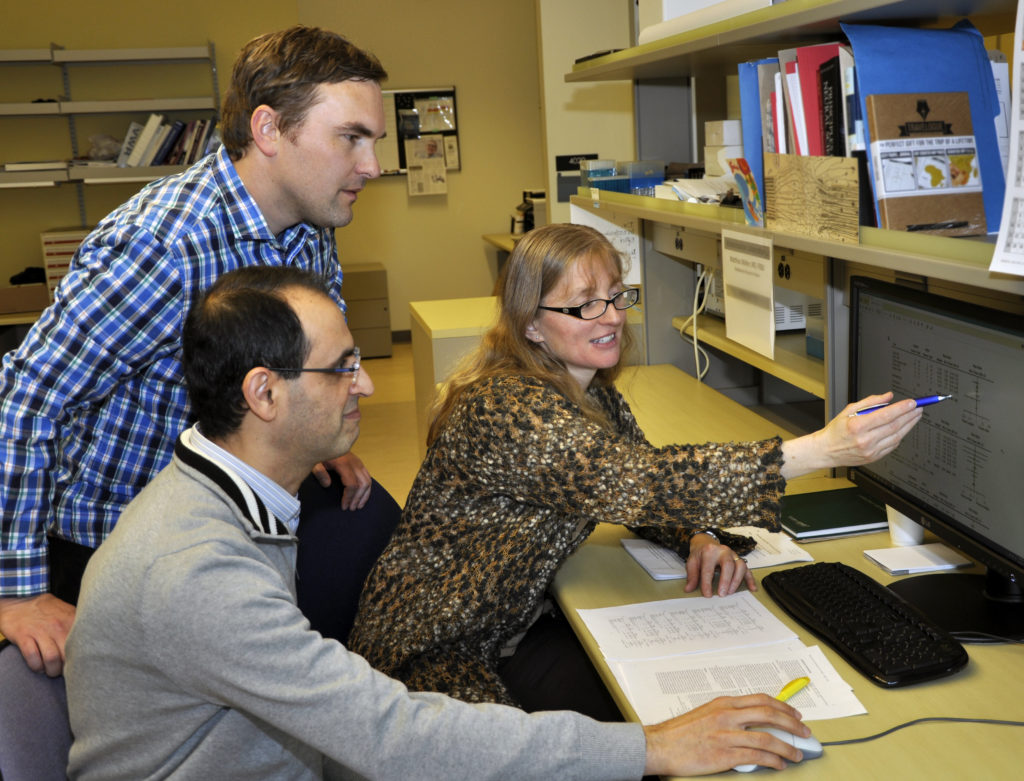
Dr. Matthias Walter (standing), a postdoctoral fellow in Dr. Krassioukov’s lab, works with Drs. Nader Fallah and Vanessa Noonan of the Rick Hansen Institute, on a project to reexamine evidence of urinary tract infections in people with SCI. (click on photo for more information)
Recent Collaborations:
As Principal Investigator on a recently awarded CIHR team grant, Dr. Krassioukov will be working with four major SCI research and rehabilitation centres (Vancouver, Toronto, Hamilton, and Winnipeg), focused on cardiovascular health in individuals with chronic SCI: locomotor training, education, and knowledge translation. For more information on this research click here.
Dr. Krassioukov is involved with educating healthcare providers, physicians, and paramedics, to diagnose, treat and prevent AD, which in turn will reduce the number of hospital days for these patients. This represents an enormous cost saving as well as a large improvement in the lives of individuals coping with AD. This work will give emergency room physicians and paramedics a set of guidelines and education for dealing with AD. He is working with Drs. Susan Harkema of the Frazier Rehab Institute in Louisville, Kentucky, Larry Vogel of Shriners Hospitals for Children in Chicago, Illinois, and Stephen Williams of the Boston Medical Center.
Major Findings:
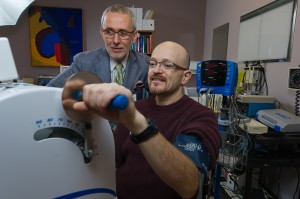
(L – R) Dr. Andrei Krassioukov with Dean Stoney, working on cardiovascular health on an arm ergometer.
Dr. Krassioukov’s basic and clinical research has been focused on AD following SCI for more than 20 years. He has developed a multi-disciplinary laboratory that is now internationally known for numerous basic science and clinical innovations in the area of AD following SCI. This serious complication of SCI was unrecognized until recently; twenty years ago, reviewers of his first grant studying the effect of SCI on the cardiovascular system believed that people with SCI didn’t need to worry about cardiovascular disease, and that the only focus should be on curing paralysis. Today, autonomic dysfunction is recognized as a major avoidable cause of morbidity in people with SCI, and is even used, at great risk, by athletes with SCI to give them a competitive advantage in paralympic sports.
He has pioneered the development of several tools that put research knowledge directly in the hands of those who could most benefit people with SCI, including the creation of a novel education tool for first responders (i.e. paramedics, EMTs), and PleasureAble: a free resource on sexual devices and adaptations for people with SCI, funded by DHRN, a MSFHR Health of Population network. These tools and resources are practical solutions to information gaps that put patients at risk and prevent full enjoyment and quality of life for people with SCI.
As a Professor of Medicine at the University of British Columbia, Dr. Krassioukov’s teaching philosophy is to foster critical thinking, creativity, and independence so that students will acquire crucial skills which will prepare them for any job in the future. His strong commitment to mentoring the next generation of clinicians and researchers drives his work as primary supervisor of several trainees. During the last 20 years of his academic career, Dr. Krassioukov has supervised or co-supervised more than 20 graduate students, and what gratifies him most as their supervisor and teacher is to see their success.
Techniques employed in the labs:
- Human electrophysiology
- Immunochemistry, histology, microscopy
- Telemetry for continuous blood pressure and heart rate monitoring
Affiliation with organizations and societies:
- American Paraplegia Society (APS)
- President, American Spinal Injury Association (ASIA)
- Board of Directors Member, American Spinal Injury Association (ASIA)
- Canadian Association of Physical Medicine and Rehabilitation (CAPM&R)
- International Spinal Cord Society (ISCoS)
Awards
Some of Dr. Krassioukov’s recent major awards and accomplishments include:
- King Charles III Coronation Medals as Spinal Cord Injury Research Trailblazers, Rick Hansen Foundation, 2025
- International member of the Brazilian Academy of Rehabilitation Medicine 2025 as an International Corresponding Member, 2025
- Dr. Meridith Marks Award for Excellence in Education (Canadian Association of Physical Medicine and Rehabilitation 2020)
- Top 5 Downloaded Articles, Published in J Neurotrauma in 2019 for “Epidural Spinal Cord Stimulation Facilitates Immediate Restoration of Dormant Motor and Autonomic Supraspinal Pathways after Chronic Neurologically Complete Spinal Cord Injury” (doi: https://doi.org/10.1089/neu.2018.6006)
- Top Cited Articles, Published in Spinal Cord in 2017 for “Movement repetitions in physical and occupational therapy during spinal cord injury rehabilitation” (Spinal Cord (2017) 55, 172-179; doi: 10.1038/sc.2016.129)
- Endowed Chair in Spinal Cord Rehabilitation Research (ICORD/UBC, 2014 – present)
- Bronze in the categories of Healthcare and Training for the ABC of Autonomic Dysreflexia (Horizon Interactive Awards, 2014)
- Apple Award for excellence in publishing spinal cord injury literature in neurology (ASIA, 2013)
- Jayanthi Lectureship Award (American Academy of SCI Professionals, 2013)
- Commemorative Medal and Diploma for the Organization of the Cardiovascular Educational Clinic at the 2012 London Summer Paralympic Games (International Paralympic Committee, 2012)
- Fellow (Canadian Academy of Health Sciences, 2012)
- Scientific Achievement Award in recognition of outstanding contribution to the hospital (Vancouver Acute, 2010)
- Commemorative Medal and Diploma for the Organization of the Cardiovascular Educational Clinic at the 2010 Vancouver Winter Paralympic Games (International Paralympic Committee, 2010)
- Inaugural Alan T. Brown Foundation Research Award (ASIA, 2009)
- 1st place in Research Contest (Canadian Association of Physical Medicine and Rehabilitation, 2005)
- Best Podium Presentation at the annual meeting (Canadian Association of Physical Medicine and Rehabilitation, 2005)
- Best manuscript in the area of SCI (ASIA, 2003)
Current Lab Members
| Undergraduate Students | Masters Students | Ph.D. Students | Medical Students | Postdoctoral Fellows | Research Staff |
|---|---|---|---|---|---|
| Thomas Thordarson | Ali Hosseinzadeh | Hari Prasad Joshi | Lucas Rempel | Dr. Tiev Miller | Andrea Maharaj |
| Ali Hosseinzadeh | Tami Kalimullina | Luke MacLean | Fiona Huang | Dr. Mohamed Sobeeh | Dr. Rahul Sachdeva |
| Omer Faraz | Antonis Kontaxakis | Aliza Hirsch | Dr. Claire Shackleton | Kiran Pawar | |
| Shreya Anand | Graeme McIntosh | Dr. Raza Malik | Jennifer Phan | ||
| Lucas Rempel | Dr. Martín Calderón Juárez | Jessica Flores | |||
| Fiona Huang | Trong (Michael) Nguyen | ||||
| Christopher Chang | Marco Law | ||||
| Stephanie Quon | Thomas Thordarson | ||||
| Daniyal Aleem | Mutjtaba Saloojee | ||||
| Lokavya Jain |
Trainee Awards
| Year | Trainee | Award |
| 2025 | Dr. Martin Calderon Juarez | Michael Smith Health Research BC Clinical Trial Post-Doctoral Fellowship: CANTRAIN-CTTP |
| Daniyal Aleem | Translational Research Prize, 2025 ICORD ARM | |
| Thomas Thordarson | 1st Place – Staff Research Prize, 2025 ICORD ARM | |
| 2024 | Dr. Raza Malik |
|
| Omer Faraz | Trainee Travel Award, ICORD | |
| 2024 | Dr. Tiev Miller | Clinical Trials Training Programs (CANTRAIN-CTTP) Postdoctoral Fellowship Award, CANadian Consortium of Clinical Trial TRAINing Platform (co-funded: Canadian Institutes of Health Research / Michael Smith Health Research BC) |
| 2023 – 2024 | Dr. Tiev Miller | Clinical Trials Training Programs (CANTRAIN-CTTP) Postdoctoral Fellowship Award |
| 2023-2025 | Dr. Claire Shackleton | Canadian Institutes of Health Research (CIHR) Fellowship |
| 2023 | Dr. Martín Calderón Juárez | Best Poster Presentation Award ($150), ICORD Trainee Symposium 2023 |
| Ali Hosseinzadeh |
|
|
| Lucas Rempel |
|
|
| Fiona Huang | Second place at ICORD trainee symposium poster prize, Annual Research Meeting | |
| Dr. Raza Malik |
|
|
| Dr. Soshi Samejima | Trainee Travel Award, ICORD | |
| 2022-2025 | Dr. Tiev Miller | Research Trainee Award: Post-Doctoral Fellowship |
| 2022 | Dr. Tiev Miller |
|
| Dr. Claire Shackleton |
|
|
| Tamila Kallimulina |
|
|
| Dr. Kiran Pawar | (TroHNS) award in spinal cord injury research, American Spinal Injury Association (ASIA) 2020 | |
| Karthik Gopalakrishnan |
|
|
| Dr. Tom Nightingale |
|
|
| 2019 | Dr. Rahul Sachdeva |
|
| Dr. Tom Nightingale |
|
|
| 2018 | Dr. Rahul Sachdeva |
|
| Dr. Tom Nightingale |
|
|
| 2017 | Andrea Ramirez |
|
| Arshdeep Marwaha |
|
|
| Dr. Rahul Sachdeva |
|
|
| 2016 | Dr. Aaron Phillips |
|
| Andrew Round |
|
|
| Jordan Squair |
|
|
| Dr. Rahul Sachdeva |
|
|
| 2015 | Dr. Katharine Currie |
|
| Dr. Aaron Phillips |
|
|
| David Popok |
|
|
| Jordan Squair |
|
|
| Mei Mu Zi (Annie) Zheng |
|
|
| Michelle Jia |
|
|
| 2014 | Michael Berger |
|
| Michèle Hubli |
|
|
| Dr. Katharine Currie |
|
|
| Dr. Aaron Phillips |
|
|
| Dr. Christopher West |
|
|
| 2013 | Katharine Currie |
|
| Michèle Hubli |
|
|
| Dr. Aaron Phillips |
|
|
| Darryl Wan |
|
|
| Dr. Christopher West |
|
|
| 2012 | Melissa Pak |
|
| Dr. Christopher West |
|
Current Opportunities In the Lab
Dr. Andrei Krassioukov is looking for two postdoctoral research fellows, one with an interest in clinical or experimental research in cardiovascular and autonomic dysfunctions following SCI (see job description), and one with an interest in neuroscience, cardiovascular and vascular biology (see job description)
Videos
Dr. Andrei Krassiuokov speaks about the CHOICES Project.
Dr. Andrei Krassioukov and post-doctoral fellow Dr. Aaron Phillips deliver a presentation on autonomic dysreflexia and spinal cord injury.
Dr. Andrei Krassioukov gives an overview of the field of cardiovascular diseases following SCI and his research in that field.
Watch Dr. Andrei Krassioukov’s Café Scientifique talk on the cardiovascular health of Paralympic athletes.
A stimulating conversation with Dr. Andrei Krossioukov with Unite 2 Fight Paralysis. In this podcast they talk with him about spinal stimulation to seek recovery of autonomic functions for chronic spinal cord injury: bowel, bladder, seal function, blood pressure regulation.
Highlighted Publications
| A cross-sectional comparison between cardiorespiratory fitness, level of lesion and red blood cell distribution width in adults with chronic spinal cord injury
Published on the 2020 February cover of Journal of Science and Medicine in Sport. |
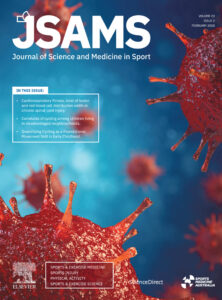 |
| Cognitive function after spinal cord injury: A systematic review. | |
| The good, the bad and the ugly of catheterization practices among elite athletes with spinal cord injury: a global perspective | |
| Rigid and remodelled: cerebrovascular structure and function after experimental high-thoracic spinal cord transection
Published on 15 March 2016 in The Journal of Physiology, Volume 594, Issue 6. |
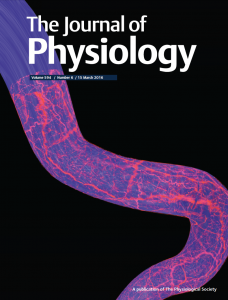 |
Recent publications
- Nakahara, R et al.. 2026. Translation and linguistic validation of the international standards to document autonomic function following spinal cord injury (ISAFSCI) for Japanese healthcare professionals.. Spinal Cord. doi: 10.1038/s41393-026-01173-6.
- Sachdeva, R et al.. 2026. Regeneration and remyelination promoting effects of spinal cord stimulation following spinal cord injury: A scoping review.. Exp Neurol. doi: 10.1016/j.expneurol.2025.115519.
- Hodgkiss, DD et al.. 2025. Electroceuticals for Paralympic Athletes: A Fair Play and Classification Concern?. Sports Med. doi: 10.1007/s40279-025-02331-1.
- Samejima, S et al.. 2025. Multi-system benefits of non-invasive spinal cord stimulation following cervical spinal cord injury: a case study.. Bioelectron Med. doi: 10.1186/s42234-025-00183-8.
- Niederberger, C et al.. 2025. German Transcreation of the International Standards to Document Remaining Autonomic Function After Spinal Cord Injury (Second Edition): A Feasibility Study in Individuals With Subacute Phase Spinal Cord Injury/Disease (SCI/D).. Top Spinal Cord Inj Rehabil. doi: 10.46292/sci25-00010.

